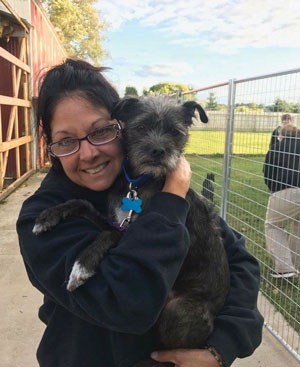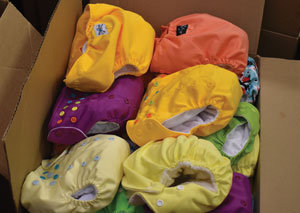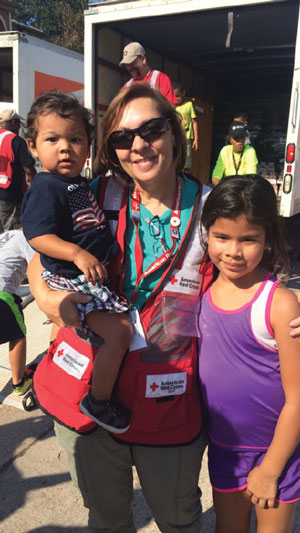Hurricane Heroes
The Fox Valley responds to Hurricanes Harvey, Irma and Maria
By Cody Wiesner and Amelia Compton Wolff
When natural disasters as dangerous as Hurricane Harvey, Irma and Maria strike, the Red Cross relies on fast and diligent responses from thousands of volunteers down to the local level. Fox Cities residents like Red Cross volunteer Jenna Geiser went to Texas after less than a day of notice, managing shelters and distributing donated relief supplies to those impacted by Hurricane Harvey.
On-location support from the Red Cross isn’t the only way locals lend support to such disasters. Geiser says “anyone can do a job, locally or nationally.” That’s certainly been true in the Fox Cities, where residents have not only volunteered to help victims, they have also donated blood, rescued animals and aided Texas cattle ranchers and their livestock.
A Swift Response
This summer and fall, the United States and Caribbean Islands saw some of their most costly and devastating natural disasters to date. Hurricane Harvey hit Texas on August 25, Hurricane Irma hit Florida on September 10 and Hurricane Maria hit Puerto Rico on September 20, each as Category 4 storms.
When disaster strikes, the whole is only is good as the sum of its parts, and that’s why providing hurricane relief requires aid from local communities all over the country.
The Fox Cities provided relief to affected communities, thanks to organizations like the Community Blood Center (CBC) in Appleton and the Red Cross’ Northeast Wisconsin Chapter.
During the first half of September, America’s Blood Centers asked the CBC for 20 units of red blood cells, but they sent 140 to Hurricane Harvey victims instead, making up 15 percent of their weekly supply. Although Texas needed a lot more blood than what the CBC could give, the Fox Cities played an important role in meeting their need.
“Texas probably used thousands of units per day,” says Kristine Belanger, vice president of donor service at the CBC. “[The CBC is] part of a network of stations worldwide. Blood centers in other areas come to help when another is in need.”
The CBC also sent platelets to Hurricane Irma victims. Platelets are important because they help the blood clot, preventing further loss, but preserving and shipping platelets across the country is easier said than done.
“Platelets are only good for five days, so anything they collected was used before the hurricane happened,” Bellanger says.
The CBC had to collect 69 all-new units and ship them to Florida on short notice, but according to Bellanger, both employees and donors worked extra hard to provide enough platelets in time.
“Donors were the heroes. They stepped up when we really needed them,” she says, “[and] we had [employees] come in for special shifts for the weekend. Everyone was committed to doing their part.”
The Red Cross in Northeast Wisconsin helped the hurricane efforts substantially as well, sending large numbers of volunteers and staff to locations affected by Hurricanes Harvey, Irma and Maria.
“We’ve been thin, to say the least,” says Barbara Behling, communications manager at the Oshkosh Red Cross. “Every day, we’re sending people to help.”
Behling says that although they sometimes cannot travel to Florida immediately due to severe road conditions, relief workers can anticipate when hurricanes hit.
“You know several days in advance when they’re going to hit. This has helped people get to a safer place or recognize they need to prepare or fend for themselves because first responders won’t be able to get to them,” Behling says. “Once the roads were safe, we were able to get there by car.”
For disaster workers, being the barrier between a hurricane victim’s life and death is part of the job. Deanna Culver, from Appleton, saved a choking man in an Irving, Texas shelter.
“She moved over [to the man], provided the spots on the back, and the elements did not dislodge. She was able to get her arms around the gentlemen who was of a larger girth and was able to give abdominal thrusts, and it dislodged,” Behling says. “She was credited with saving that gentleman’s life.”
Puppy Love
Humans weren’t the only species affected by the hurricanes. Thousands of animals, including domesticated pets and strays, were impacted as well.
 One Appleton-based nonprofit, Saving Paws Animal Rescue, decided to help. Saving Paws is a 100-percent volunteer-run organization founded in 2006 with the mission to rescue homeless animals. Co-Director Glenda Stadler says for the past four years, Saving Paws has partnered with Houston K911, another nonprofit that works to reduce stray animal overpopulation in the Houston area. Houston’s stray animal population was already high, but after Hurricane Harvey hit it increased dramatically. Stadler contacted Houston K911 and learned they were in dire need of animal food and supplies.
One Appleton-based nonprofit, Saving Paws Animal Rescue, decided to help. Saving Paws is a 100-percent volunteer-run organization founded in 2006 with the mission to rescue homeless animals. Co-Director Glenda Stadler says for the past four years, Saving Paws has partnered with Houston K911, another nonprofit that works to reduce stray animal overpopulation in the Houston area. Houston’s stray animal population was already high, but after Hurricane Harvey hit it increased dramatically. Stadler contacted Houston K911 and learned they were in dire need of animal food and supplies.
“We put out a post on Facebook that we were going to do a donation drive and take some supplies down to Houston and the response was absolutely overwhelming,” Stadler says.
Donations began pouring in from as far as Port Washington and Northern Wisconsin. “We had to get a warehouse donated to hold all the donations,” Stadler says. Over Labor Day weekend, Stadler and her team drove to Houston in two vans containing 7,000 pounds of animal food, water, crates and supplies. One of the best moments of the trip for Stadler was seeing the reaction from her Houston K911 contact.
“When we opened the van she was kind of speechless,” Stadler says. “They were so very appreciative.”
Once the vans were emptied of supplies, they were filled with foster dogs to be brought back to Wisconsin. “We brought back 13 dogs that were already in foster programs to open up space for animals displaced by the hurricane and hopefully help reunite some of the animals with owners down there,” Stadler says.
A 6-month-old Lab mix named Max was one of the 13 dogs Savings Paws rescued from Houston. Alan Tanner, a brand manager for Kimberly-Clark Corporation in Neenah, and his family of six adopted Max shortly after he arrived in Appleton.
“With four kids, we knew we needed a special dog,” Alan says. “When we met Max, the kids were pulling his ears and tail and he took it like a champ. It didn’t bother him at all.”
While it was Max’s laidback personality that ultimately won the Tanner family over, his connection to Hurricane Harvey was personal for Alan, who has a brother living in Houston.
“Being so far away, there wasn’t a lot we could do,” he says, “but this felt like a concrete way we could help and open up an awesome foster home for another dog that really needs it.”
Relief for Ranchers
According to the Texas Department of Agriculture, the state leads the nation in its number of farms and ranches, with 248,800 farms and ranches covering 130.2 million acres. In 2012, Texas’ number one commodity by cash receipt was cattle to the tune of $10.5 billion.
Threats to the cattle industry mean threats to the foundation of the Texan economy. No one understands this better than Fremont residents Eric and Nicki Scott, director of livestock sales for MWI Animal Health and agricultural company representative for Bo Brown Company, respectively. The Scotts have decades of experience in the animal health industry, so when Hurricane Harvey hit Texas, the husband and wife team knew the impact would be devastating and were compelled to act.
In 24 hours, the Scotts collected enough donations from friends and neighbors to fill their horse trailer with 5,000 pounds of supplies. When they left for Texas, the only plan was to meet a group of Eric’s coworkers who work in the Beaumont, Texas area.
“I knew all the rural areas where my guys work were really affected, so that’s where we wanted to focus,” Eric says. “We figured we’d just meet up and drive until somebody needs help.”
 When they arrived in Texas, the Scotts discovered cattle neck-deep in water, flooded vet clinics and exhausted ranchers. They began distributing animal health products like antibiotics, vaccines, needles and syringes to area animal shelters and a temporary veterinary clinic set up in a vacant car dealership.
When they arrived in Texas, the Scotts discovered cattle neck-deep in water, flooded vet clinics and exhausted ranchers. They began distributing animal health products like antibiotics, vaccines, needles and syringes to area animal shelters and a temporary veterinary clinic set up in a vacant car dealership.
The Scotts were stationed at a ranch belonging to one of Eric’s clients in Devers, Texas. Nicki helped treat some of the cattle and horses that suffered foot abscesses and infections from standing in water for days. They also provided a community meal for the locals, which provided a much needed emotional break.
“On two different nights we met up at a fairgrounds and fed all the ranchers who were working all day,” Eric says. “It was the first time those ranchers had gotten together since the storm hit a week ago. They had been going 24/7 and could finally come and get a steak sandwich and a beer.”
The Scotts worked in Texas for five days before returning home. It was difficult to leave, Nicki says, when there was so much more work to be done. Eric says his memory is burned with images of homes with all their contents sitting curbside.
“It really makes you think about what everybody says, that’s it’s just stuff, it doesn’t matter,” Nicki says, “but it’s different when you’re in there with rubber gloves and boots on.”
Wrapped in Hope
Natural disasters can leave vulnerable populations completely devastated. In an effort to meet basic survival needs, other essential necessities are often forgotten.
 “When you think about disaster relief, you think about food, clothing and shelter. You don’t think about diapers,” says Stephanie Bowers, co-founder and executive director of Jake’s Diapers in Kaukauna. “But the impact of diapers is sanitation, hygiene and access to education. It’s so basic, but so overlooked.”
“When you think about disaster relief, you think about food, clothing and shelter. You don’t think about diapers,” says Stephanie Bowers, co-founder and executive director of Jake’s Diapers in Kaukauna. “But the impact of diapers is sanitation, hygiene and access to education. It’s so basic, but so overlooked.”
Bowers founded Jake’s Diapers in 2013 to provide diapers to babies, children and adults in extreme poverty, both locally and globally. Now the nonprofit organization is partnering with The Rebecca Foundation’s Cloth Diaper Closet, a diaper bank, to provide diapers for children affected by Hurricanes Harvey, Irma and Maria. The Rebecca Foundation is a partner agency of Jake’s Diapers and had 14 active chapters throughout Texas, Florida and Puerto Rico that were unable to meet needs due to the hurricanes’ impact.
Bowers says the partnership capitalizes on each organization’s strength – Jake’s Diapers will collect, prepare and provide diapers and The Rebecca Foundation will distribute them. To date, the team has delivered 547 cloth diaper kits to Texas, Florida and Puerto Rico.
 Bowers is also partnering with CaringCrowd, an online crowdfunding platform powered by Johnson & Johnson, which is matching all donations to support her efforts in hurricane relief and rebuilding. Donors are fully funding projects supporting Puerto Rico in a matter of days and sometimes hours, Bowers says.
Bowers is also partnering with CaringCrowd, an online crowdfunding platform powered by Johnson & Johnson, which is matching all donations to support her efforts in hurricane relief and rebuilding. Donors are fully funding projects supporting Puerto Rico in a matter of days and sometimes hours, Bowers says.
“We are breaking Johnson & Johnson’s fundraising records because of the work we are doing,” Bowers says.
Even with all this success, the need for diapers is far from met – 3,000 babies remain on the hurricane relief waiting list. Bowers says efforts in Puerto Rico will continue for the foreseeable future.
“We are up to 547 kids directly impacted by the hurricanes who we are helping,” Bowers says. “It might not seem like a lot, but one at a time is how you make things happen.”











Leave a Comment